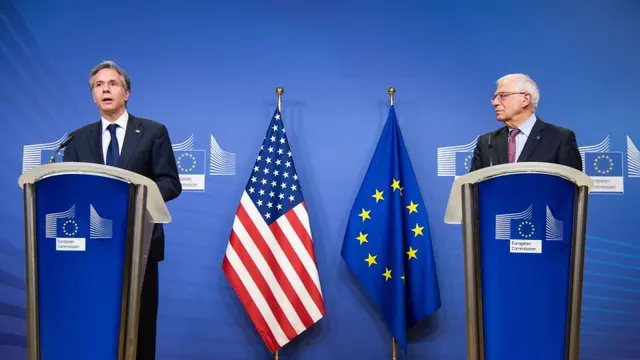"Mission Accomplished," exclaimed US President Donald Trump in the wake of a quick run of missile attacks against Syria. But what was the mission? And where's the evidence of a chemical attack? What happened to obtaining authorization from the United Nations to launch attacks against another sovereign nation? Too many questions remain unanswered. But what is clear is that international law was violated.
US President Donald Trump speaks to the nation, announcing military action against Syria for the recent apparent gas attack on its civilians, at the White House, Washington, DC, April 13, 2018. /VCG Photo.
No evidence of a chemical attack
Three Western countries – the United States, the UK and France – launched airstrikes against Syria on dubious grounds – the suspected chemical attack. First of all, we do not know for sure if there was a chemical attack. Second, we have no idea what kind of chemicals were used, assuming that a chemical attack took place. And third, who launched the attack: the Syrian government, the rebels or the terrorist groups?
The priority should have been to conduct an independent and impartial investigation before any decision was made about how to respond. Then, based on the findings, the international community would proceed to the next step of either ignoring the event, if it was fake, or assigning blame to the party or parties responsible for such a gross act, if it did happen.
Logic dictates that there is little reason to believe Syria's Assad government would have launched anything like a chemical attack, as it has been winning on the battlefield.
In this image released by the US Department of Defense, the guided-missile cruiser USS Monterey fires a Tomahawk land attack missile on April 14, 2018. /VCG Photo.
Besides, Trump announced his intention to pull US troops out of Syria a few days before the reported attack. Why should Assad launch a chemical attack, which would only compel Trump to continue the United States' presence inside Syria?
On the contrary, US allies in the region including Israel, Saudi Arabia, and Syrian rebel forces dread the prospect of US withdrawal. There's also strong opposition from the US military to such a move.
Rules-based world order
When the big powers debated in the UN what the next step should be, there was confusion in the media coverage as to the source of the suspected chemical attack. Western media, once bitten by the Iraq blunder, were actually rather careful in carrying the story by using words like "suspected" frequently. Others claimed that the incident was fake news created by the controversial White Helmets organization, which used to be accused of staging attack scenes.
There is no consensus yet on whether there was a chemical attack, because there is no solid evidence besides video clips and pictures. The right path going forward would have been continuous consultation within the UN Security Council despite the differences between Russia and the United States.
Iraqi protesters wave Syrian flags during a demonstration in Basra, opposing the joint Western air strikes against Syria's government, April 15, 2018. /VCG Photo.
But what we all know now is that the United States, along with the UK and France, took military action against Syria early Saturday morning. Such an act, without the authorization of the United Nations, is against international law.
The rush is said to be partly due to the push from UK Prime Minister Theresa May, who needed to act quickly to avoid the issue being subject to parliamentary inquiry. And France played its part too, suggesting that it would go it alone if the United States chose not to participate.
The West often lectures other countries about the "rule of law" or the "rules-based world order." But it ignored these principles and the authority of the United Nations when it pounded Syria with missiles. Few media stories challenged the lack of a UN mandate or the lack of evidence. Instead, the Western media are rife with domestic concerns, such as whether their governments have the right to wage wars, or what the strategic plan is for Syria, or the pressures they are feeling from hawkish politicians for more strikes.
Anti-war demonstrators take part in a protest in New York City, US, April 15, 2018. /VCG Photo.
Fifteen years ago the United States invaded Iraq without a mandate from the United Nations, and based on fake evidence. The media from the countries that joined the United States on its mission played along, cheering the rush into an illegal war after swallowing fabricated evidence from enemies of Saddam Hussein.
That military adventure resulted in the deaths of 100,000 Iraqi civilians. And many more were displaced. But no politicians were held accountable for participating in the war crimes.
Under the pretext of humanitarian consideration, the latest strike on Syria again sidelined the United Nations and damaged the rules-based global order.
(CGTN)
 简体中文
简体中文

